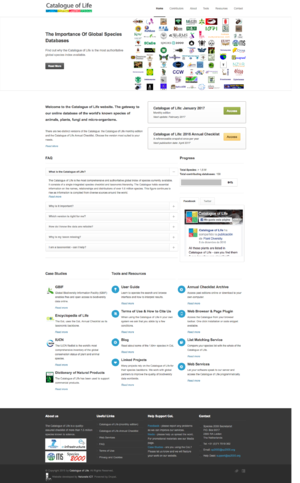Diferencia entre revisiones de «Catalogue of life»
(Página creada con «URL: http://www.catalogueoflife.org/ Wayback Machine: http://web.archive.org/web/20160810203408/http://www.catalogueoflife.org/ Categoría:En espera Categoría:Cien...») |
|||
| (No se muestran 5 ediciones intermedias de 3 usuarios) | |||
| Línea 1: | Línea 1: | ||
| − | URL: http://www.catalogueoflife.org/ | + | [[Archivo:Screenshot-www.catalogueoflife.org 2017-03-05 23-34-14.png|miniaturadeimagen|derecha]] |
| + | |||
| + | == <small>'''Autodefinidos'''</small> == | ||
| + | |||
| + | ''The Catalogue of Life is the most comprehensive and authoritative global index of species currently available. It consists of a single integrated species checklist and taxonomic hierarchy. The Catalogue holds essential information on the names, relationships and distributions of over 1.6 million species. This figure continues to rise as information is compiled from diverse sources around the world.'' | ||
| + | |||
| + | ''The loss and degradation of global biodiversity are vital concerns for humanity. There is currently no single, universal and complete reference to what species we think are alive today. Without this we can not sustainably use, explore, monitor, manage and protect biodiversity resources.'' | ||
| + | |||
| + | ''The Catalogue of Life is used to support the major biodiversity and conservation information services such as the Global Biodiversity Information Facility (GBIF), Encyclopedia of Life (EoL) and the International Union for Conservation of Nature Red List. It is recognised by the Convention on Biological Diversity as a significant component of the Global Taxonomy Initiative and a contribution to Target 1 of the Global Strategy for Plant Conservation.'' | ||
| + | |||
| + | ''The Catalogue of Life is widely used by organisations and individuals worldwide: Research scientists, policy and decision makers, citizen scientists and other global biodiversity programmes use it to: | ||
| + | '' | ||
| + | ''Check the scientifically accepted name, spelling, alternative names and distribution of a species | ||
| + | Find the place of an organism in a consistent and integrated taxonomic hierarchy | ||
| + | Compile checklists of species in a particular area or taxonomic group using downloads | ||
| + | Download an electronic list for use in systems and portals | ||
| + | Provide an electronic taxonomic backbone for indexing and compiling other information | ||
| + | Carry out biodiversity analyses''. | ||
| + | |||
| + | == <small>'''Descripción'''</small> == | ||
| + | |||
| + | == <small>'''Enlaces'''</small> == | ||
| + | |||
| + | '''URL:''' http://www.catalogueoflife.org/ | ||
| + | |||
| + | '''Wayback Machine:''' http://web.archive.org/web/20160810203408/http://www.catalogueoflife.org/ | ||
| + | |||
| + | '''Wikipedia:''' https://es.wikipedia.org/wiki/Catalogue_of_Life | ||
| − | |||
[[Categoría:En espera]] | [[Categoría:En espera]] | ||
| Línea 7: | Línea 33: | ||
[[Categoría:Inglés]] | [[Categoría:Inglés]] | ||
[[Categoría:Holanda]] | [[Categoría:Holanda]] | ||
| − | |||
[[Categoría:Contenido abierto]] | [[Categoría:Contenido abierto]] | ||
| − | |||
[[Categoría:Ciencia abierta]] | [[Categoría:Ciencia abierta]] | ||
| + | [[Categoría:2001]] | ||
Revisión actual del 02:21 11 jun 2017
Autodefinidos
The Catalogue of Life is the most comprehensive and authoritative global index of species currently available. It consists of a single integrated species checklist and taxonomic hierarchy. The Catalogue holds essential information on the names, relationships and distributions of over 1.6 million species. This figure continues to rise as information is compiled from diverse sources around the world.
The loss and degradation of global biodiversity are vital concerns for humanity. There is currently no single, universal and complete reference to what species we think are alive today. Without this we can not sustainably use, explore, monitor, manage and protect biodiversity resources.
The Catalogue of Life is used to support the major biodiversity and conservation information services such as the Global Biodiversity Information Facility (GBIF), Encyclopedia of Life (EoL) and the International Union for Conservation of Nature Red List. It is recognised by the Convention on Biological Diversity as a significant component of the Global Taxonomy Initiative and a contribution to Target 1 of the Global Strategy for Plant Conservation.
The Catalogue of Life is widely used by organisations and individuals worldwide: Research scientists, policy and decision makers, citizen scientists and other global biodiversity programmes use it to: Check the scientifically accepted name, spelling, alternative names and distribution of a species Find the place of an organism in a consistent and integrated taxonomic hierarchy Compile checklists of species in a particular area or taxonomic group using downloads Download an electronic list for use in systems and portals Provide an electronic taxonomic backbone for indexing and compiling other information Carry out biodiversity analyses.
Descripción
Enlaces
URL: http://www.catalogueoflife.org/
Wayback Machine: http://web.archive.org/web/20160810203408/http://www.catalogueoflife.org/
